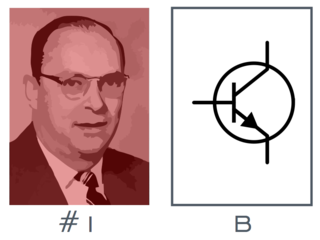John Bardeen

The transistor was invented by physicists John Bardeen, Walter Brattain and William Schockley in 1947, while working at Bell Labs.
Tiny semiconductor transistors quickly replaced the large vacuum tubes used earlier and paved the way to the electronic revolution and the information age.
The microprocessor in your laptop, for example, contains billions and billions of transistors.
Curiously, John Bardeen is the only person to have won the Nobel Prize in Physics twice. In addition to a first one for the invention of the transistor in 1956, he received a second one in 1972 for the development of a fundamental theory of superconductivity.
Want to learn more?
Basic electronics is part of every physicist’s training; in your Physics degree at Heriot-Watt you can study electrical circuits and microelectronic devices in courses B37EE (Introduction to Electrical and Electronic Engineering) and B20SO2 (Semiconductor Optoelectronics).
Additionally, you can get plenty of hands-on experience in building electronic circuits in our yearly experimental lab courses.